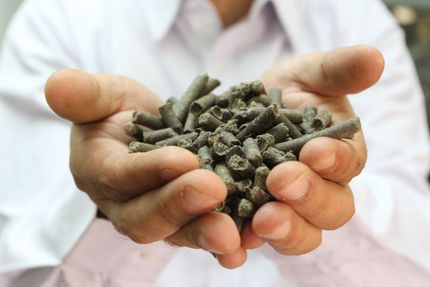The circular economy – resource-efficient and digital
Can the digital transformation pave the way for resource-efficient materials cycles?
As yet, only around 14 per cent of the raw materials used in German industry are derived from recycling processes. But how can this proportion be increased and waste disposed of in a way that is safer and more environmentally friendly? A study by the German Federal Environment Ministry takes the position that the circular economy would especially benefit from digitalisation – whilst at the same time revealing that the subject is not really being systematically addressed yet. Dr Henning Wilts, Head of the Research Unit Circular Economy, and Dr Holger Berg, Project Co-ordinator for the Research Unit Circular Economy at the Wuppertal Institute, are therefore focusing their attention on this issue. They are working on a “Circular Economy Literacy” framework, which is intended to pave the way for the digital and resource-efficient circular economy. The authors describing in detail this issue in the recently published “in brief”.
Germany’s waste management system is one of the world’s most advanced. Its chief objective is to dispose of waste in a way that is safe for both people and the environment – yet, more than 85 per cent of the raw materials for industrial use are still sourced from primary materials. Although the potential for optimisation is great, the reality is still far removed from so-called closed-loop systems. Secondary raw materials recovered from waste – referred to as recyclates – have previously been fed back into production and usage processes at volumes that are far below what is possible. This means loss of value, creates dependency on volatile commodity markets, lowers resource productivity and increases environmental pollution. The study “The Digitisation of Environmental Technology”, commissioned by the German Federal Ministry for the Environment, Nature Conservation, Building and Nuclear Safety (BMUB), indicates that no other lead market in the environmental sector stands to benefit from digitalisation more than the circular economy, whilst also suggesting that no sector has ever been so poorly positioned.
Companies are still relying too much on primary materials instead of recycled raw materials – although the latter may actually be less expensive. A key reason for this lies in the lack of information: when and where waste is produced that can be used as recyclates is much less clear than is the case for primary materials from mining, for example. In addition, the value of waste materials is heavily dependent on their composition and what is known about them: which are the waste materials that are hazardous and expensive to dispose of, and what waste is practical to recycle? For this reason, Dr Henning Wilts, Head of the Research Unit Circular Economy at the Wuppertal Institute, stresses that: “,There is an urgent need for better coordination of flows of materials and information, if we are to advance the transition to the circular economy.”
“Information about the quantity and especially the quality of products and the raw materials they contain must be gathered, analysed and retained”, adds Dr Holger Berg. For example, there would be significantly higher incentives for the materials-based recycling of plastic waste if the precise material composition (including all additives) of all products contained in the waste were known, or if this information could be obtained at a reasonable cost.
Until now, it has not been possible to overcome much of this information deficit. However, the researchers Wilts and Berg anticipate that the digital transformation could provide the solution, because it is, for a number of reasons, an information revolution and can thus serve as the link to enable the implementation of the circular economy.
The digital transformation is paving the way for the circular economy
Solutions will need to go much further than simple waste disposal concepts, come into effect much earlier in the production process and also include consumption-related decisions to a greater extent than before. The ultimate objective is to prevent waste as far as possible and to enable a resource-efficient circular economy. To that end, the Wuppertal Institute is working to develop circular economy literacy. In the recently established Circular Economy research unit, Dr Henning Wilts and Dr Holger Berg are evaluating how such comprehensive change processes can be made possible and set on the right tracks. Their projects aim to bring together the various stakeholders and provide a strategic vision for a digital circular economy in North Rhine-Westphalia, Germany and Europe. Everyone wants digitalisation, everyone wants a circular economy – but what is the shared vision, and how do we achieve it? The following four points will be of particular importance:
- Building bridges: linking digitalisation and the circular economy
- Closing gaps: dedicated support for small- and medium-sized enterprises (SMEs)
- Providing guidance: where is the digital circular economy making progress?
- The big picture: in what areas can the digital circular economy make a real difference?
Wilts adds: “In order to establish a resource-efficient and digital circular economy, industry, the waste management sector and companies will need to be networked so that a functioning value creation network can be built.”






















































